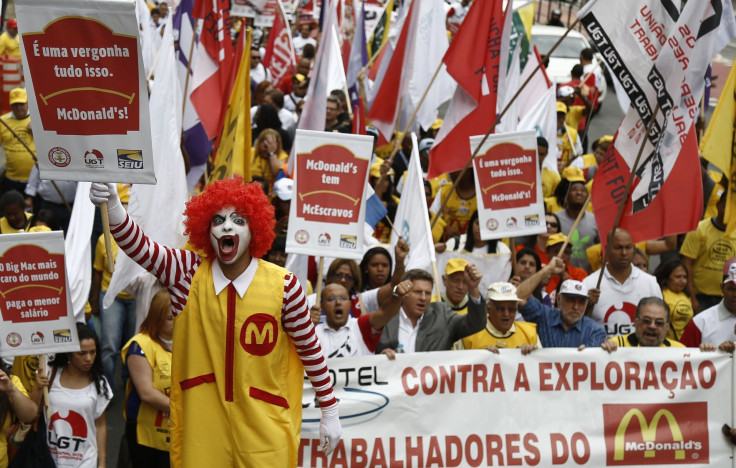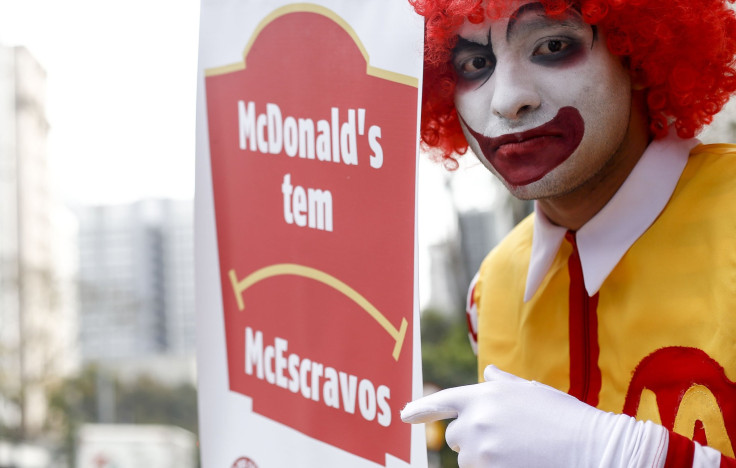Why 'Fight For 15' Brought Its McDonald's Fight To Brazil

Fast-food workers with the Fight for 15 movement have become a regular sight in American cities. And now the union-led campaign has hopped hemispheres to Brazil, where McDonald's workers are assembling to demonstrate for higher wages and a union.
More than 1,000 McDonald's employees -- some done up in Ronald McDonald garb and macabre facepaint -- chanted slogans and held signs in central Sao Paulo earlier this week to protest low pay and difficult working conditions. On Thursday, labor leaders and McDonald’s workers from five continents descended on the capital city of Brasilia to lay out their grievances against McDonald’s.
Meanwhile, Brazil’s top labor prosecutor announced Thursday the launch of a task force into alleged labor law violations on the part of McDonald’s. McDonald’s has denied the charges.
“We are certain we are acting responsibly and fulfilling all Brazilian laws,” read a statement from Arcos Dorados, McDonald's Brazilian franchisee. “Additionally, we have not received information on any such alleged complaint from the Brazilian judicial authorities.”
The Service Employees International Union, the second-largest American labor organization, has pushed Fight for 15 outside the border in part to energize a campaign that has achieved some isolated wage victories since its 2012 launch, but it has yet to win collective bargaining rights for fast-food employees. Now the SEIU, which helped facilitate the hearings, is playing hardball.
And McDonald’s, the chief target of the Fight for 15 effort, has been on its heels lately. Negative press and competition from fast-casual chains like Chipotle have driven down sales and disappointed Wall Street, even as the company’s presence abroad continues to grow.
The SEIU’s Brazilian gambit is intended to ratchet up the pressure on McDonald’s in its increasingly profitable overseas arms. Scott Courtney, the architect of the SEIU’s Fight for 15 campaign, told the New York Times that the effort would likely expand into other markets through the fall.
At the Brazilian hearing, Courtney explained the SEIU’s reasoning in expanding its McDonald’s campaign into Brazil. “It’s right that this company should have to face judgement in a country that is distinguished by a government, a legal system, and a civil society that puts workers first.”
Despite the SEIU’s full-court press, McDonald’s has declined to sit at the bargaining table. CEO Steve Easterbook, who took charge in March, has attempted to steer the hamburger chain in a “progressive” direction. In April, McDonald’s raised the wages for 90,000 workers at the company’s directly owned restaurants, though the move left pay at franchise locations unaffected.
But the company has kept up its steadfast resistance to unionization efforts. Most recently, McDonald’s filed with the National Labor Relations Board to push back on a ruling that would pave the way for franchise workers to formally bargain with the company.
Organized labor isn’t the only group pressuring McDonald’s. At the prodding of American advocacy groups -- the SEIU among them -- European authorities are currently probing the company’s tax practices, which critics charge have allowed it to avoid more than $1 billion in taxes using a Luxembourg subsidiary.

Earlier this week, Brazilian labor leaders formally requested an investigation into alleged tax abuses and anti-competitive practices on the part of McDonald’s. The company employs 45,000 people in Brazil.
Adriana Alvarez, 23, was one of the employees brought to Brazil to testify about her working conditions. Alvarez told International Business Times that she and other workers at a Chicago franchise faced verbal abuse from management and were forced to work off the clock. Eventually, the workers came together and presented a petition to management. “We didn't even ask for a raise; we asked for respect and for them to stop breaking labor laws.”
Still, a raise soon followed and Alvarez says she now makes $10.50 an hour. But she still isn’t satisfied for her co-workers. "Some of these people have been here 10, 15 years and I'm almost making as much as them."
Additional reporting by Cole Stangler.
© Copyright IBTimes 2024. All rights reserved.






















